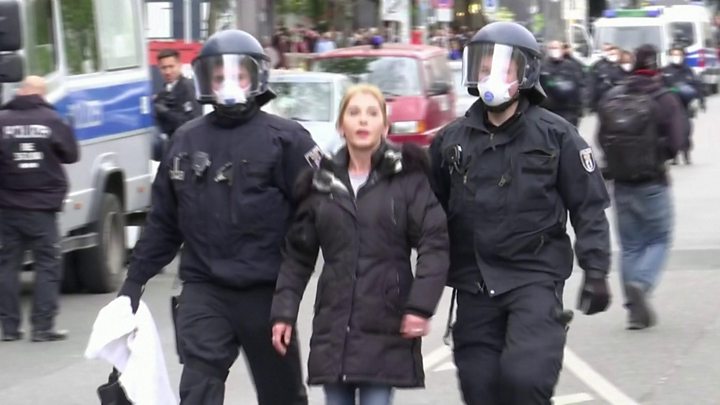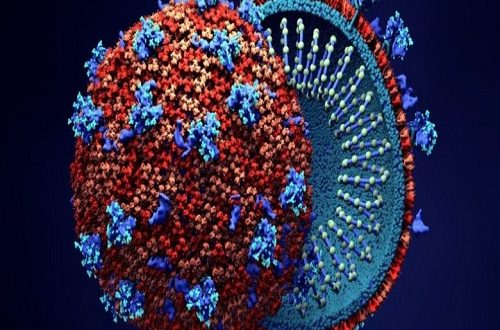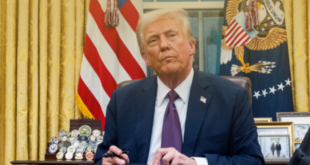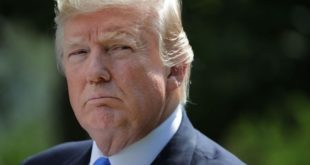A woman lifts the weights over her head one last time then drops them to ground with a grunt of exhaustion, turning her head towards the slight breeze coming in from the open door.
This ladies-only gym in Düsseldorf has just reopened. Life in Germany is beginning to look a little like it did before coronavirus silenced its beer gardens, grounded its aircraft and brought production lines to a standstill.
Schools, businesses, restaurants, shops and churches have either reopened or are about to – with strict social distancing measures. There’s even the promise of summer holidays elsewhere in Europe.
But Britta, who’s just finished her workout, is unsure about easing restrictions.
“I’m torn,” she said. “I enjoy the new freedoms but at the same time I’m rather scared, maybe it was too early. I think people need to be careful still and mustn’t be careless.”
Germany’s calm and successful handling of the pandemic attracted international attention. But its next moves have been chaotic, characterised by squabbling between regional leaders which has culminated in a faster lifting of restrictions than Chancellor Angela Merkel would have liked.
The leaders of Germany’s 16 states have the power to decide how and when they do that.
Unable to agree a common strategy, they’ve instituted a patchwork of rules and regulations, with people in one state able to, for example, use the gym again, while in another region, fitness centres have remained closed.
It’s fuelled an intense public debate about the “Lockerung” or relaxation policy, with many fearing that Germany could squander its initial success.
“It’s too soon, we’re easing up too fast and too much and we risk a second wave,” said Professor Frank Montgomery, who chairs the World Medical Association.
Professor Montgomery speaks for many when he says that there’s been “a beauty contest” from the premiers of the different German states which “risks all that we have achieved”.
In the warmth of the early evening sun, cyclists glide around couples and families strolling along Düsseldorf’s riverfront. Under a pavement table, a dog opens a lazy eye as a waiter brings beer and wine to cheerful customers.
As yet, there’s been no significantly adverse effect (beyond a couple of outbreaks linked to churches and slaughterhouses) on Germany’s infection figures. But, with newly reopened shops and restaurants reporting that customers are cautious and slow to return, it may be too soon to tell.
Surveys suggest that the German public were accepting of the restrictions, that they approved of Angela Merkel’s cautious approach, despite the terrible impact on the country’s economy.
So why have some regional politicians been so enthusiastic to open up society again?
Some appear to have been spooked by recent street protests against the measures, perhaps remembering how the small grassroots protest movement Pegida grew into a full-on backlash against Mrs Merkel’s refugee policy and seats in parliament for the far-right party Alternative for Germany (AfD).
The anti-lockdown movement – which appears to be dwindling – has brought together left and right wing extremists, conspiracy theorists and anti-vaxxers, and could hardly be said to represent the general population.

Is political succession shaping lockdown policy?
But many suspect there’s another reason for that so-called beauty contest. Angela Merkel is due to stand down next year after four terms in office. The race to succeed her was well under way but the coronavirus crisis has transformed political and public life and, with it, the chances of those with ambitions to the Chancellery.
Some, like the businessman Friedrich Merz, have all but disappeared from the spotlight while others, like the country’s health minister Jens Spahn or Bavaria’s premier, Markus Söder – who grabbed headlines by announcing the first lockdown in his state – are being talked about as possible chancellors in waiting.
Armin Laschet, whose office overlooks the Düsseldorf waterfront, has been one of the most voluble agitators for a swift relaxation of coronavirus restrictions.
The premier of North Rhine-Westphalia – and one of the leading chancellor candidates – denies that his approach has anything to do with trying to maintain a high profile through the crisis.
“The measures we had to decide now are so important – a matter of life and death – you couldn’t act on a tactical basis,” he said. “Among the population it was much more popular to close everything down but I thought that was wrong…I acted out of a basic sense of responsibility to this state.”
He’s a cheerful chap who enthusiastically jabs a finger at official charts showing the downward trend in infection rates. Mr Laschet says it’s best that every region, with their differing economies, geographies and infections, should act independently.
“We have the health problem of the pandemic, the infection, disease, but there are other damages,” he said.
“For children from disadvantaged backgrounds: If they can’t go to school for 10 weeks they lose chances. Sick people who didn’t have Covid-19 didn’t get treatment because the hospitals were reserved for Covid-19. People in care homes got lonely, lost the will to live.”
“These are damages too and they claimed lives. It’s why I always thought you have to consider both sides of the story, not just the virological one,” he said.
Not far away, in a tent outside a care home, I sit opposite Katharina Resch. A perspex screen divides us but it means we can talk safely, face to face.
The relaxation has meant her family has now been able to visit the pensioner. But the staff worry. They’ve kept the virus out but fear the impact of a second lockdown on their residents if general infection levels rise.
Katharina’s concerned, likening the rush to lift restrictions to upending a sack of potatoes.
“I’m sceptical that this head over heels [approach] is a good thing,” he said. “But I think politicians are so under pressure that they have to do something.”
A care worker wheels Katharine back into the home and she waves goodbye. Germany may have got its outbreak under control for now but scientists and politicians are watching anxiously.
It is, as Angela Merkel has repeatedly acknowledged, a fragile success.
BBC
 Home Of Ghana News Ghana News, Entertainment And More
Home Of Ghana News Ghana News, Entertainment And More





